Are you looking for the best free eCommerce platform to build your eCommerce website?
In the early days, eCommerce platforms used to cost thousands which kept many small businesses from creating an online store. Luckily now there are several popular eCommerce platforms that offer free or low-cost options.
In this article, we will compare the best and most popular free eCommerce platforms that you can use to start an online store. We have a detailed pros and cons analysis for each so that you can choose the best eCommerce website builder for your needs.
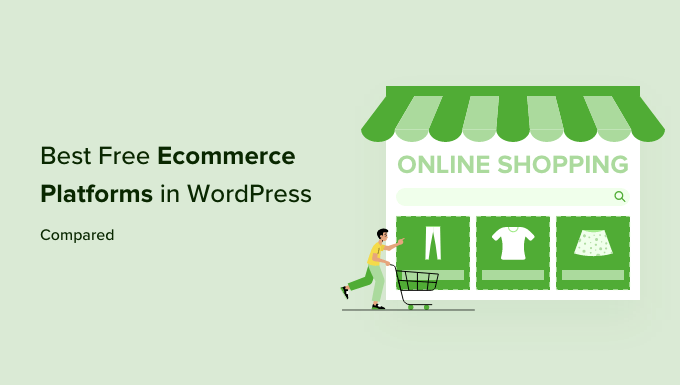
How to Choose the Best Free eCommerce Platform
Let’s be honest: there is no such thing as a 100% free eCommerce platform.
Even when the eCommerce platform itself is free, you will have to pay for a domain, web hosting, payment processing fees, and other extension costs.
We have a detailed guide on the real cost of building eCommerce websites.
With that said, your goal should be to find an eCommerce platform that helps you get started at the lowest to no cost without putting severe limitations on how you run or grow your business.
You would also want the platform to be easy to use full-featured, with the ability to accept payments using your preferred payment methods.
Keeping these things in mind, let’s take a look at the best free eCommerce platforms that you can use to make money online and grow your business.
1. WooCommerce

WooCommerce is the world’s most popular eCommerce plugin for WordPress. It’s a completely free open-source eCommerce platform that you can download and run on any web hosting provider.
Since WooCommerce doesn’t provide hosting for you, you’ll need to buy web hosting and a domain name to make sure your website can be accessed by users worldwide.
We recommend using either Bluehost or SiteGround. They are both among the largest hosting companies in the world and are officially recommended by WooCommerce.
Bluehost is even offering WPBeginner users a free domain name + SSL certificate and a generous 60% discount on hosting. Basically, you can get started for $2.75 per month.
→ Claim This Exclusive Bluehost Deal ←
Pros
- It’s easy to get started with WooCommerce. You can create an online store quickly, even if you’re a total beginner.
- You’ll be hosting your website yourself, which gives you full control. Although you’ll need to pay for WooCommerce hosting, this doesn’t have to cost a lot.
- There are loads of WooCommerce themes (designs), giving you the opportunity to create a store that truly reflects your brand.
- There are thousands of WooCommerce plugins that you can use to add new features and grow your business.
- You can sell anything with WooCommerce, whether it’s physical products, digital downloads, membership plans, dropshipping stores, or affiliate products.
- You can add unlimited products to your store, which gives you the freedom to grow your eCommerce business as big as you want.
- WooCommerce doesn’t charge you any transaction fees at all. You’ll only have to pay your payment service provider, like PayPal or Stripe, or your bank.
- WooCommerce gives you all the capabilities to rank your pages. It is a plugin from WordPress, so it’s built on top of the best content management system. That means you’ll have access to plenty of SEO and blogging tools to drive more traffic to your store.
Cons
- If you’re a total beginner, WooCommerce has a bit of a learning curve and can be trickier to get started with than some other options. You’ll need to buy hosting and a domain name, for instance.
- You’ll be responsible for maintaining your online store as it grows. This might mean upgrading your hosting plan, optimizing your WordPress site for SEO, or paying for a security plugin.
To help beginners get started, we have the most detailed WooCommerce tutorial on the web that helps you build an eCommerce website with WooCommerce.
2. Web.com Website Builder
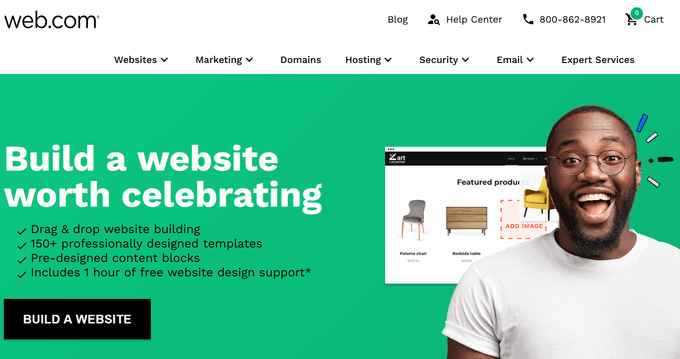
Web.com website builder doesn’t have a free plan, but it offers a very affordable plan that allows you to create an online store without spending a lot of money.
Web.com will host the store and even provide you with a free custom domain and free SSL certificate.
You’ll be able to have up to 500 products in your store, accept credit cards, track & manage your orders, link to the Facebook marketplace, and more.
Pros
- You can build an online store with Web.com drag & drop website builder. You can get a free custom domain name of your choosing.
- You can sell both physical and digital products through your store. You can use Web.com to track your inventory.
- 24/7 email and live chat support are available.
- You can add a blog to your store’s website for free, though the blogging software is very basic and doesn’t offer the same features as a blogging platform like WordPress.
Cons
- Pricing starts at $13.95 per month for the eCommerce Essentials plan.
- The eCommerce features are not as powerful as WooCommerce or Shopify.
3. BuyNow Plus
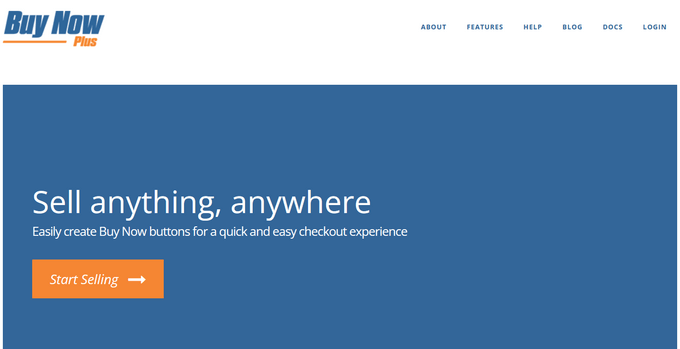
BuyNow Plus is not a full eCommerce platform. Instead, it lets you create “buy now” buttons that you can put on any website.
You’ll need to create a free Stripe account in order to use BuyNow Plus.
Pros
- The transaction fee is pretty low at 3% per transaction. Keep in mind that Stripe charges its own transaction fees on top of this, though.
- You can use BuyNow Plus to handle recurring payments on credit cards without your customers needing to set up an account. If you’re selling recurring memberships for offline items, then this is a really handy feature.
- You can put the button links on social media as well as on your website, or you can even use them in emails.
- There’s no limit to how many different products you can sell using BuyNow Plus.
Cons
- BuyNow Plus doesn’t offer anything extra, like inventory management or a store builder.
- You could do something similar by using Stripe directly on your website. That way, you wouldn’t need to pay BuyNow Plus’s transaction fee. You’d need your own SSL certificate, but it’s possible to get an SSL certificate for free.
4. BigCommerce

BigCommerce is a fully hosted (or all-in-one) eCommerce platform that you can use to create your eCommerce store. There’s also a WordPress plugin available if you have an existing site that you want to use with BigCommerce.
While they don’t have a free plan available, there is a free trial that lets you set up your online business and get started without paying anything.
Pros
- You don’t have to enter any credit card details to take the free trial.
- BigCommerce is really easy to get started with. You can just sign up, enter details about your store, and start adding products.
- You can get a free domain like mystore.mybigcommerce.com if you don’t want to pay for a custom domain name.
- BigCommerce gives you plenty of different ways to take payments. It has built-in integration with lots of payment platforms, including PayPal powered by Braintree, Stripe, Authorize.net, and more.
- There are lots of third-party apps that you can add to your BigCommerce store to extend its functionality.
- There are lots of pre-built templates and themes to give your storefront a professional look.
Cons
- The free trial only lasts for 15 days, which doesn’t give you long to start making money from your store. After that, you’ll need to pay $29.95/month or more to keep your store going.
- BigCommerce is an all-in-one platform, which means you’re limited to using their addons and themes. You won’t have the range of choices that you’d have with some other eCommerce solutions.
Related: See our comparison of WooCommerce vs BigCommerce for more details.
5. Shopify
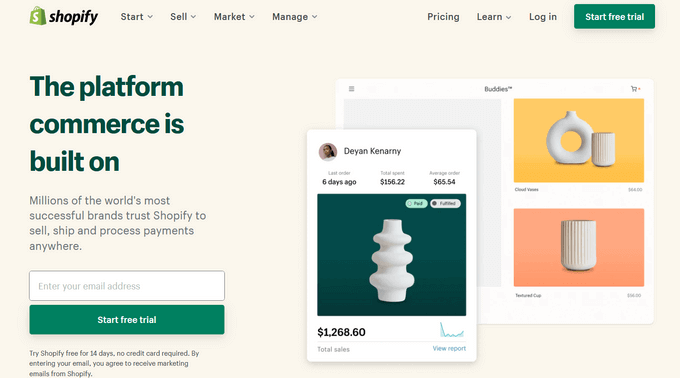
Shopify is another fully hosted eCommerce platform. Shopify also offers a 14-day free trial, and, like BigCommerce’s free trial, this doesn’t require a credit card.
Pros
- It’s really easy to get started with Shopify. Their website builder has a drag-and-drop interface, which means even total beginners can create a great-looking online store.
- If you want to add extra features to your store, there’s an app marketplace with lots of add-ons that you can buy.
- There’s 24/7 support available through live chat, phone, email, and Twitter.
- Shopify Payments (Shopify’s built-in payment gateway) charges 2.9% plus 30 cents per transaction. Since this is a built-in feature, which has the same price as Stripe or other payment processors, this makes it easier for users to get started.
Cons
- If you use other payment gateways, like PayPal or Stripe, Shopify charges a 2% transaction fee. This is on top of the fee charged by the third-party payment gateway.
- The free trial only lasts 3 days. After that, you’ll need to move on to a paid plan. While the cheapest is normally $29/month, it is currently discounted to just $1 for the first 3 months.
Related: For more details, see our comparison of Shopify vs WooCommerce.
6. Weebly

Weebly isn’t quite as well known as some other eCommerce platforms, like Shopify and WooCommerce, but they offer a free trial where you can test out the platform.
Pros
- You can add any kind of physical or digital products to your store
- The drag-and-drop interface is easy to use to build your site and manage items in your store.
- There are around 100 different themes (designs) you can choose from, so you should be able to find something that’s just right for your site.
- Built-in checkout, inventory, shipping, and taxes management features.
- As well as the community forum, the free plan gives you access to live chat, email, and even phone support.
- If you do want to upgrade to a paid plan, these are affordable even for very small businesses and startups. The Professional plan starts at $12 per month, paid annually.
Cons
- Weebly charges a 3% transaction fee. That’s in addition to the transaction fee that your payment gateway charges.
- If you’re on the free or Personal ($10/month) plans, Weebly will show ads and branding from Square, Weebly’s parent company.
- Even with the paid starter plan, you are limited to selling only 25 products at a time.
7. Big Cartel
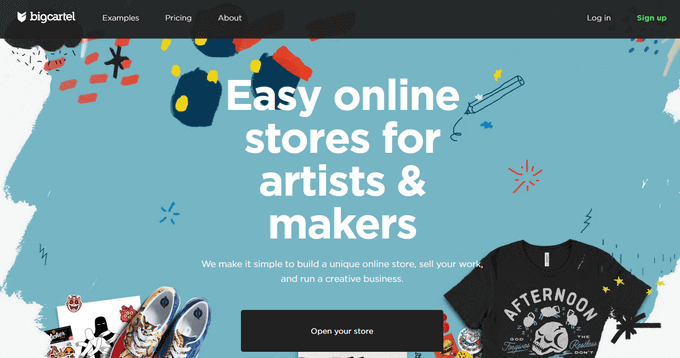
Big Cartel is a hosted eCommerce platform that’s designed especially for artists and creatives. If you want to have a store selling handmade products or similar, it could be a great option for you.
Pros
- The free plan doesn’t have any transaction fees. You will need to pay Stripe or PayPal fees, though (these are the only options Big Cartel offers for payment processing).
- Your free shop URL can be customized. It has to be in the format name.bigcartel.com, but you can choose whatever you want for the name. Many other platforms assign you a specific URL based on your username or store name, and you can’t change it.
- You can have up to 5 products on your free plan, which makes it more generous than other hosted free plans.
- It’s quick to get your store set up and easy to add your products. Big Cartel walks you step by step through the process.
- The free plan comes with features like real-time analytics and marketing tools to run promos and discounts.
Cons
- If you want to customize your website theme, you’ll need to edit the theme’s HTML. This definitely isn’t as beginner-friendly as most other eCommerce platforms.
- The free plan only has limited features. You need to upgrade to a paid plan if you want to use things like inventory tracking or discount codes.
Choosing the Best Free eCommerce Platform
So, which is the best free eCommerce platform for you? That depends on what you’re looking for.
If you want to start cheap and have full freedom to grow your business, then WooCommerce is the best option. The plugin is made for selling, including all the features you need to build a responsive store fast.
With over 100 payment gateways, plenty of SEO tools, and powerful analytics, it’s arguably the most robust eCommerce platform out there.
Using our exclusive Bluehost deal, you can get started for $2.75 per month. That’s less than a cup of coffee.
If you want to use a non-WordPress eCommerce platform that’s affordable, then take a look at Web.com website builder. It’s easy to use and quite affordable when compared to Shopify or Bigcommerce. However, it is limited in terms of features and flexibility that you get with other platforms.
If you want to try out an online store for free but you’re happy to pay for something that’s a good fit for your business, then BigCommerce and Shopify are great full-featured options.
We hope this article helped you learn about the best free eCommerce platforms to get started with. You may also want to see our guide on the best email marketing services and best live chat software for eCommerce so you can increase your store sales.
If you liked this article, then please subscribe to our YouTube Channel for WordPress video tutorials. You can also find us on Twitter and Facebook.





Syed Balkhi says
Hey WPBeginner readers,
Did you know you can win exciting prizes by commenting on WPBeginner?
Every month, our top blog commenters will win HUGE rewards, including premium WordPress plugin licenses and cash prizes.
You can get more details about the contest from here.
Start sharing your thoughts below to stand a chance to win!
Mrteesurez says
Bigcommerce and Shopify are seems to be recommendable after Woocomerce, the best ever, and also for if you can not afford to buy hosting plan and custom domain, although you will not have full control over the store but it will just get you started and sell your products online.
Thanks for this head to head ecommerce platforms comparisons.
WPBeginner Support says
You’re welcome
Admin
Moinuddin Waheed says
woocommerce is the best option for e-commerce websites.
This is a powerful tool with all the features and options to make awesome online store.
since it is a plugin and works on top of WordPress, it becomes easy for wordpress users to work with same set of wordpress knowledge and scale.
It comes with integrations with lots of important services.
Appreciate the efforts to make a comparative analysis of all the options.
Kathie says
Want to get more informed on the options and this was a great start❣️
Thank you!
WPBeginner Support says
You’re welcome!
Admin
Kiran Patil says
Very Informative .
WPBeginner Support says
Thank you
Admin